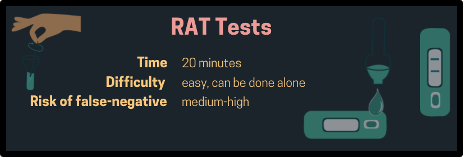PCR COVID test vs. Rapid Test: What is the difference?
It’s 2022 and we all thought COVID would be a distant memory by now. Unfortunately, it still seems to have us in its grip, so we are going to spend January updating what we know about the pandemic. From vaccines to tests, a lot has changed since March 2020.
We spoke a little about vaccines last year, but the focus has shifted in recent months as we near the threshold for herd immunity. Now that we are trying to live with the virus, testing has become the most important factor.
While no test can be 100% accurate, the PCR test is more sensitive. A false-positive is very unlikely and would only occur because of poor testing or contaminated samples. The chance of a false-negative is higher because sample often contain too little of the virus to detect.
What is a PCR test?
· Must be conducted in a lab
· Takes several hours to display results
· Highly sensitive
· Low risk of false-negative
PCR stands for polymerase chain reaction and is conducted on small fragments of DNA extracted from the saliva and/or respiratory mucus in the nose. The samples are collected by medically trained professionals and purified to create full DNA chains.
RT-PCR (reverse transcription-polymerase chain reaction) collects RNA, which is then reverse transcribed into DNA. RT-PCR tests use polymerase (DNA-building enzymes) to create the corresponding DNA sample, which is an extra step than standard PCRs.
In both types of PCR test, the purified DNA sample is repeatedly heated and cooled, causing the proteins to break down and multiply. This makes the virus (if present) more easily detectable in its higher concentration.
PCR tests are currently the most effective test for COVID-19, because of their ability to detect weak concentrations of the virus. They are, however, time-consuming as each heat cycle is repeated over 30 times.
This time constraint created the need for a faster and more accessible method of testing.
What is an RAT test?
· Can be completed at home
· Takes up to 20 minutes to display results
· Less sensitive than PCRs
· Medium to high risk of false-negative
Rapid antigen tests (RATs) are fulfilling the need for an at-home testing option. We can collect our own samples and interpret our own results all in a matter of minutes.
RATs, like PCRs, take a nasal swab to collect a DNA sample. The sample is then mixed with an extraction buffer (liquid solution) that separates the protein and – if present – the virus from the rest of the DNA.
The combined solution is then dropped onto a strip with 3 lines of antibodies that will either attach to the virus or not. If the virus is present in the sample, it will attach to the antibodies on the first line.
Those antibodies will then react with the other 2 lines (one for COVID: the test line, one not for COVID: the control line) and change their colour. A negative sample will not have attached to the antibodies, so will bypass the test strip and create only a control line.
RATs may be up to 100 times less accurate than RT-PCRs, which is why much of the government advice was to follow up a negative result with a PCR if you have symptoms or another reason to believe you could have COVID.
Long testing queues and pressure on laboratories mean that RATs are now accepted in most states in place of PCRs, but regular follow-up testing can reduce the higher chance of a false-negative.
What is the difference between a rapid test and a PCR?
RATs and PCRs both test for COVID, but one is faster and slightly more likely to give a false-negative. RATs are great, but anyone with symptoms might want to follow up a negative test with a PCR to make sure they aren’t positive.
Speak with your doctor if you are concerned about COVID: testing or otherwise.



